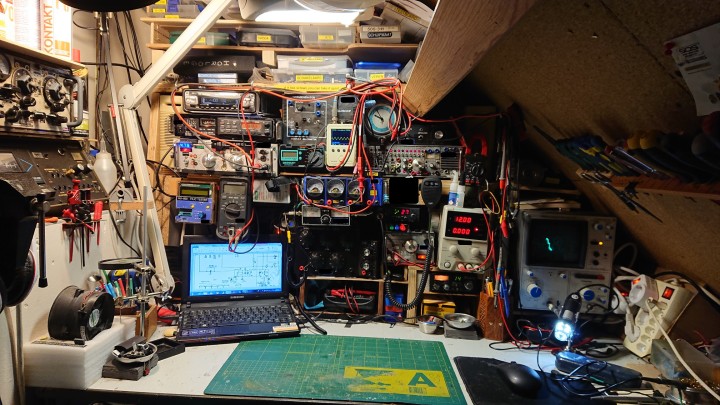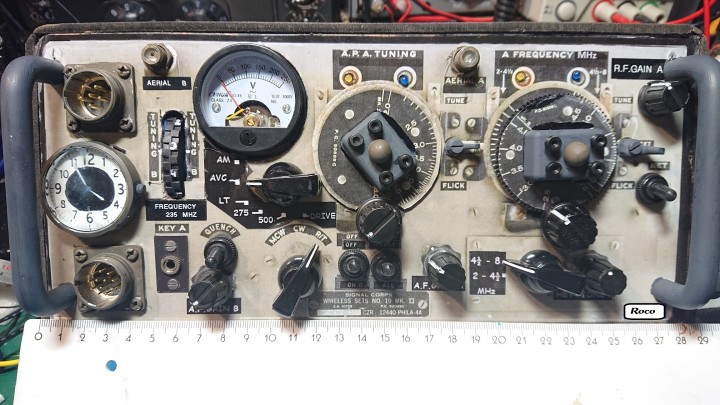A Dutch Innovator's Workspace for DIY Projects, Retro Electronics, and More
on

Ronald Cobet, a retired primary school teacher from Almelo, Netherlands, has turned his attic into a space where he brings his love for electronics to life. For more than 20 years, he has used this workspace to work on everything from simple DIY electronics projects to restoring vintage electronic devices.
Alina: How would you best describe your space? And how do you use it?
Alina: When you designed and/or set up your space, what were your requirements and goals?
Ronald: When I started my bench, I built some items myself and wanted a bench to be able to build DIY electronic kits and simple repairs, but after I retired, I started to get some extra devices to be able to repair and restore old electronic devices.
Alina: Tell us about your technical interests. What sort of projects do you work on in your space? Why do you focus on such projects?
Ronald: Since I was about 12 years old, I have been interested in receivers, small transmitters, and building small DIY devices for use with model trains or just for fun. I also enjoyed building simple power supplies and measuring equipment. After that, I tried to teach myself how to better use all the devices, always aiming for a higher level. My ultimate goal has been to be able to repair a radio, tape recorder, or monitor, even though I am not formally educated in this work.

Ronald: On my bench, you will find a soldering station, an oscilloscope (restored by me), multimeters, transceivers, a variety of tools, power supplies, a sound generator, a digital microscope, a capacitor tester, etc.
Do you enjoy learning about where other engineers and makers work on electronics projects? Take a look at these electronics workspaces.
Alina: What do you consider to be your most important or valued piece of equipment or tool?
Ronald: My Monacor multimeter, Hameg 105 oscilloscope, and soldering station are my most important items. They are essential for measuring voltages, finding defective parts, replacing them, and getting things working again. Of course, my laptop is also crucial for accessing service manuals.
Alina: Is there anything special or unique about your space? What makes this feature so special or important?
Ronald: My bench is special to me, as it has all the items I need for what I want to do. I am a happy man; I can't think of any device to add to my bench.
Alina: Are you planning anything new for your space?
Ronald: No plans for new stuff, but in the near future, I might be forced to replace my soldering station, which has already been in use by me for more than 30 years.

Alina: Tell us about your favorite electronics-related project. What did you build?
Ronald: My favorite project was restoring the Philips tape deck reel-to-reel N4504. It had several defects, both mechanical and electronic, and through this project, I learned to read schematics. I learned to read them from left to right and to follow a signal route in the schematics. Once you are (a bit) trained in this, it becomes easier to find defective parts. However, I restrict myself from entering the world of chips and ICs. One must know their limits.
Alina: Are you currently working on an electronics or programming project?
Ronald: Not at the moment. I just finished a half-scale model of the WS 19 set MK II, which I used to have many years ago — just for demo, not working.
Alina: Do you have any advice, tips, or encouragement for other engineers or makers who are thinking of putting together a workspace?
Ronald: Just get yourself a workspace that is always there and is out of sight. Make sure to have a main security switch to power off the whole bench with one switch. Always leave the bench powerless when you are not working and have a small fire extinguisher on hand — just for that 0.01% chance something goes wrong.
Show off Your Electronics Workspace!
Would you like to share details about your workspace with our global community of engineers, students, and makers? Take a few minutes to fill out this online form, so Elektor's editors can contact you!




Discussion (1 comment)